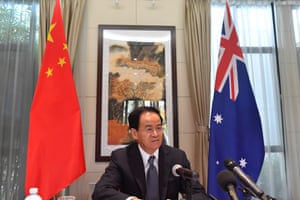
China’s top envoy to Australia has blasted as “ridiculous” the claim that Beijing’s economic coercion has been the cause of tensions between the two countries.
China’s ambassador, Cheng Jingye, also cautioned Australia against “teaming up in [a] small group against China” – in an apparent reference to initiatives like the Quad with the US, Japan and India. Cheng said Australia should not play the “victim game”.
Speaking during a webinar arranged by the Australia China Business Council, Cheng repeated many of Beijing’s objections against Canberra’s actions over the past few years, including the “discriminatory” blocking of certain Chinese investment proposals, exclusion of Huawei from the 5G network, and the Covid-19 global inquiry call.
But Cheng also added to the list last week’s “unreasonable and irrational tearing up” of the Belt and Road agreements between the Chinese government and Victorian state government. He branded an example of “negative moves by the Australian side” that had “poisoned the atmosphere”.
According to a transcript issued by the Chinese embassy, he said:
“It seems that being tough on and even attacking China has become a politically correct thing to do. What is more astonishing is that some Australians claim that such provocations and confrontation are ways to safeguard Australia’s values, national interests and security.”
Cheng said some people in Australian claimed “that the problems in bilateral trade ties resulted from China’s economic coercion against Australia” but he added: “What a ridiculous and irrelevant argument.”
Cheng said Australia had “launched 106 anti-dumping, anti-subsidy probes on Chinese imports, but for the Chinese part, there are only four such investigations into Australian products”.
“Therefore, if there is any coercion, it must have be done by the Australian side.”
Cheng said China never asked Australia to “compromise its sovereignty or national interests but cannot accept Australia damaging China’s sovereignty and national interests” – a reference to the Australian government’s public criticism of the crackdown on dissent in Hong Kong and human rights abuses in Xinjiang.
After blowback against the so-called list of 14 grievances issued by the Chinese embassy last year, Cheng said China did not want to interfere in Australia’s domestic legislature but opposed any Australian legislation that was “deliberately targeting” China. He also said China did not intend to interfere with the freedom of the press in Australia, before urging the media to cease “maliciously smearing or attacking China”.



